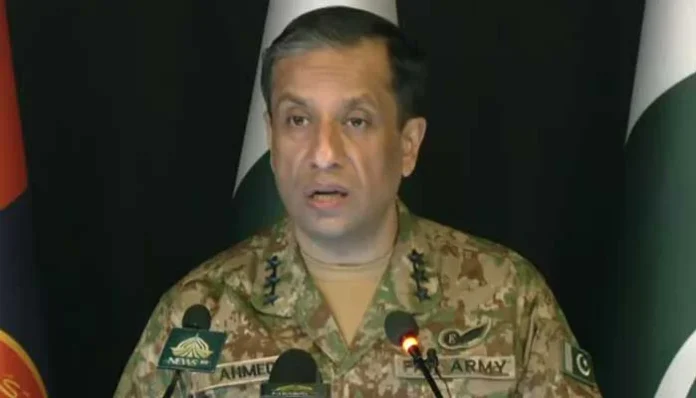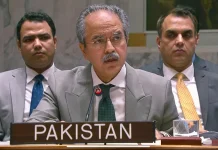WEBDESK
PESHAWAR – Pakistan Army spokesperson Lt Gen Ahmed Sharif Chaudhry on Friday warned that the recent surge in terrorism across Khyber Pakhtunkhwa (KP) was the outcome of years of deliberate neglect, political expediency, and the space given to militants and their facilitators.
Addressing a detailed press briefing in Peshawar, the Director General of Inter-Services Public Relations (ISPR) said that governance and public welfare in the province had been intentionally weakened, leaving its people to “pay the price with their blood.”
He cautioned that Afghanistan must not be allowed to serve as a sanctuary for terrorists, accusing Indian proxies of orchestrating attacks against Pakistan from Afghan soil. “There is clear evidence that India is using Afghan territory as a base camp for terrorism against Pakistan,” he asserted, adding that 135 foreign militants were killed while infiltrating from Afghanistan over the past two years, and 30 Afghan nationals were involved in suicide attacks.
Lt Gen Chaudhry identified five key reasons behind the persistence of terrorism in Pakistan:
Incomplete implementation of the National Action Plan (NAP);
Political point-scoring and vested interests on the issue of terrorism;
India’s use of Afghanistan for anti-Pakistan activities;
Availability of modern weapons and safe havens to militants in Afghanistan; and
The nexus between terrorists and criminal networks under political patronage.
He stressed that the full implementation of NAP’s 14 points was crucial for national security, lamenting that political considerations had overshadowed collective security priorities. The DG ISPR also expressed concern over the slow pace of judicial proceedings in terrorism-related cases, noting that no terrorist had been convicted by anti-terrorism courts in KP so far this year.
Citing data, he revealed that over 10,000 narcotics cases were registered across the province, but only 679 convictions were secured. Likewise, out of 33,000 illegal arms cases, just 6,945 led to convictions.
“The eradication of terrorism requires every institution to fulfill its constitutional and moral responsibility,” he said, adding that the Pakistan Army and other security forces were conducting daily intelligence-based operations to restore lasting peace.
Lt Gen Chaudhry warned that repeated failures to implement agreed national decisions had emboldened terrorists. “Talking about negotiations with such elements dishonours the sacrifices of our martyrs,” he remarked. Drawing a historical analogy, he questioned: “When India fired missiles at Pakistan on May 6 and 7, targeting children, women, mosques, and madrassas, did anyone suggest holding talks the next day?”
He emphasized that while dialogue has its place, not every conflict can be resolved through talks. “Even the Holy Prophet (PBUH) stood firm for truth during the Battle of Badr, despite facing his own tribesmen,” he said.
The military spokesperson criticized political leaders for propagating misleading narratives for personal and political gain instead of forging a unified stance against terrorism. He noted that although provincial governments had resolved to break the nexus between militancy and organized crime — including narcotics, extortion, kidnapping for ransom, and smuggling — local and political elements often shielded such networks when action was taken.
He added that judicial proceedings had been equally affected by this nexus. As of August 2025, 34 terrorism cases remained under trial in KP, with over 4,500 others pending for up to three years.
Despite earlier decisions to strengthen the Counter-Terrorism Department (CTD) in 2014 and 2021, Lt Gen Chaudhry said its manpower still stood at only 3,200 — far below the operational needs. “We salute the courage of KP’s police and CTD officers, but their numbers are insufficient to counter the growing threat,” he added.
Under NAP, the registration and reform of religious seminaries was also mandated, yet only 55 percent — or 4,355 — of madaris in KP had been registered so far. “If registration itself is incomplete, how can uniformity in curriculum and oversight mechanisms be ensured?” he asked.
Concluding his address, the DG ISPR reiterated that Pakistan’s long-term security and stability depended on the comprehensive implementation of the National Action Plan, judicial reforms, and the strengthening of law enforcement institutions.











